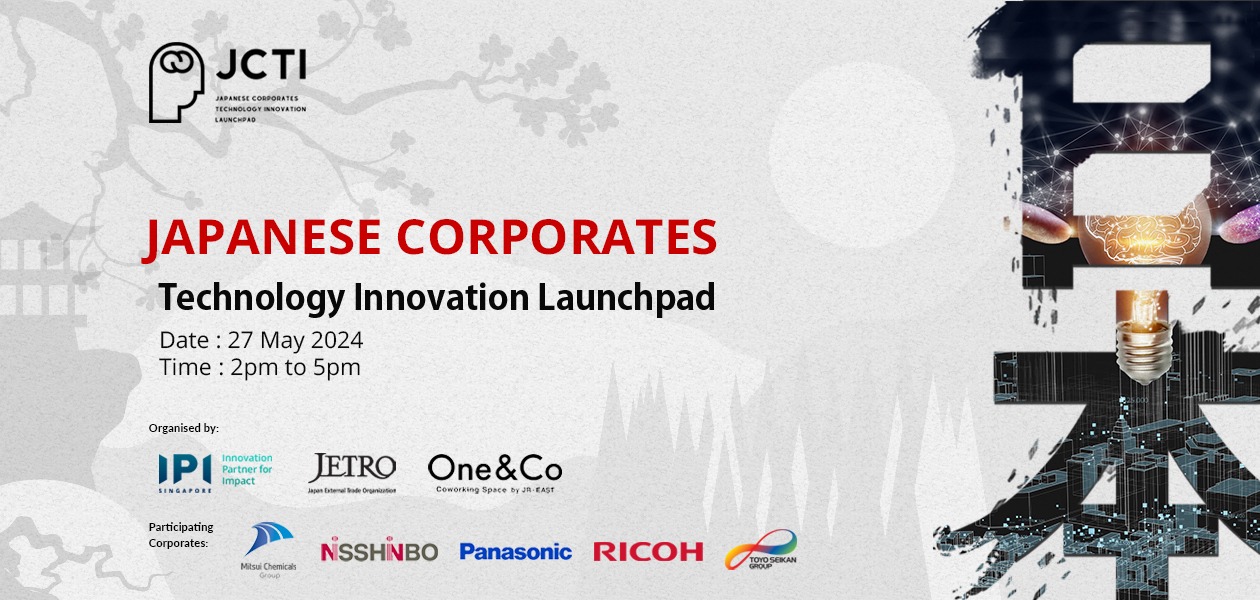At IPI’s recent Japanese Corporates Technology Innovation (JCTI) Launchpad Networking Event in Singapore, leading Japanese companies unveiled their latest technologies to potential partners, investors and industry experts.
As industries increasingly operate on a global scale, cross-border collaboration has become crucial for companies to drive growth and stay ahead of the curve. This was evident at the “Japanese Corporates Technology Innovation Launchpad Networking Event” held on 27 May 2024 in Singapore, where five leading Japanese companies—Ricoh, Toyo Seikan, Panasonic, Nisshinbo and Mitsui Chemicals—showcased some of their latest technologies.
Organised by IPI in partnership with the Japan External Trade Organization (JETRO) and One&Co Singapore, this exclusive event aimed to bring together Japanese innovation and Singapore's strategic position as a global technology hub. Central to the event was JCTI's goal of consolidating all Japanese corporates in Singapore to carry out their innovation activities under the JCTI platform. Conceived by IPI’s Ben Tan and Steven Lee, this synergy would present opportunities for multinational companies, start-ups and governmental organisations to collaborate and leverage complementary expertise, building an ecosystem that drives co-creation.
"The JCTI event reinforces IPI’s commitment to fostering cross-border collaboration," said Ben Tan, Senior Manager, Strategy, Marketing & Communications. "By partnering with JETRO and One&Co Singapore, we aim to bridge Japanese innovation with Singapore's strategic position as a global technology hub. This event is a testament to our dedication to creating an ecosystem where multinational companies, start-ups, and governmental organisations can co-create and drive technological growth."
"At IPI, our mission is to catalyse innovation through strategic partnerships," remarked Steven Lee, Senior Manager, Innovation & Technology. "This event not only highlights the cutting-edge technologies from leading Japanese companies but also emphasises the pivotal role Singapore plays in the global technology landscape. By facilitating this collaboration, we are enabling companies to harness complementary expertise and drive forward-thinking solutions."
Innovation lies at the heart of the event, as there was a display of cutting-edge advancements and technology sharing. Ricoh, for instance, presented an AI-powered platform that streamlines the creation of virtual replicas for buildings. This innovative solution utilises three-dimensional (3D) scans and advanced software to create accurate digital models. The benefits are numerous, from simplifying construction processes to facilitating better lifecycle cost management.
As for Toyo Seikan, they spotlighted their revolutionary bioprocess solution for cell manufacturing. This technology addresses a critical challenge in the rapidly growing field of cell and gene therapy: the need for scalable production methods. It uses automated systems and special bags to grow cells in a safe and consistent way, speeding up the production of cells needed for new therapies. The system can also be used for drug testing and mass production of cells.
Panasonic, a household name in electronics, introduced a communication system that uses existing wiring infrastructure, like phone lines and power cables, to transmit data. This cost-effective alternative to the traditional wired Ethernet and wireless systems is especially useful in areas with difficult wiring conditions, such as concrete buildings and underground spaces. By utilising existing infrastructure, Panasonic's technology provides high-speed communication and significantly reduces installation costs.
Meanwhile, Nisshinbo focused on their AI-powered Time-of-Flight sensors that address a growing concern in healthcare: patient safety, especially for the elderly. These non-intrusive sensors monitor patient movements and predict fall risks by capturing depth data without compromising privacy. They can identify if a person is in bed, sitting or has fallen in real-time, and send alerts to caregivers. This low-power, easy-to-install system offers a cost-effective solution for continuous monitoring in healthcare settings.
Finally, Mitsui Chemicals introduced a range of novel thermoplastic materials with unique properties, including superior sliding characteristics, high resistance to abrasion and exceptional gas permeability. These materials serve as sustainable and high-performance alternatives to traditional fluoropolymers, which are synthetic polymers known for their resistance to heat, chemicals and weathering. With applications spanning from automotive parts to medical packaging, they promise longer product lifespans, improved efficiency and safer alternatives across various industries.
Masato Tanakai, Senior Director, Startup & Innovation, JETRO Singapore, commended the event’s success, saying, “I believe such events can significantly strengthen ties between Japanese and Singaporean companies by enabling direct interaction and trust-building. This also facilitates the sharing of information on the latest technology trends and market needs.” Tanakai-san also identified healthcare, deep tech, blockchain and agri-food tech as emerging areas of opportunity for co-creation.
Overall, the event underscored the potential of international collaboration in creating progress and fostering technological breakthroughs. By working together, the global innovation community can unlock a future filled with groundbreaking technologies that improve lives across various industries.
.jpg)

.jpg)
.jpg)
.jpg)
.jpg)
.jpg)
.jpg)
![[Event Recap] Innovation in Action: Singapore’s Food Sector Steps Up](/assets/34135135/images/transparent-related-content.png)